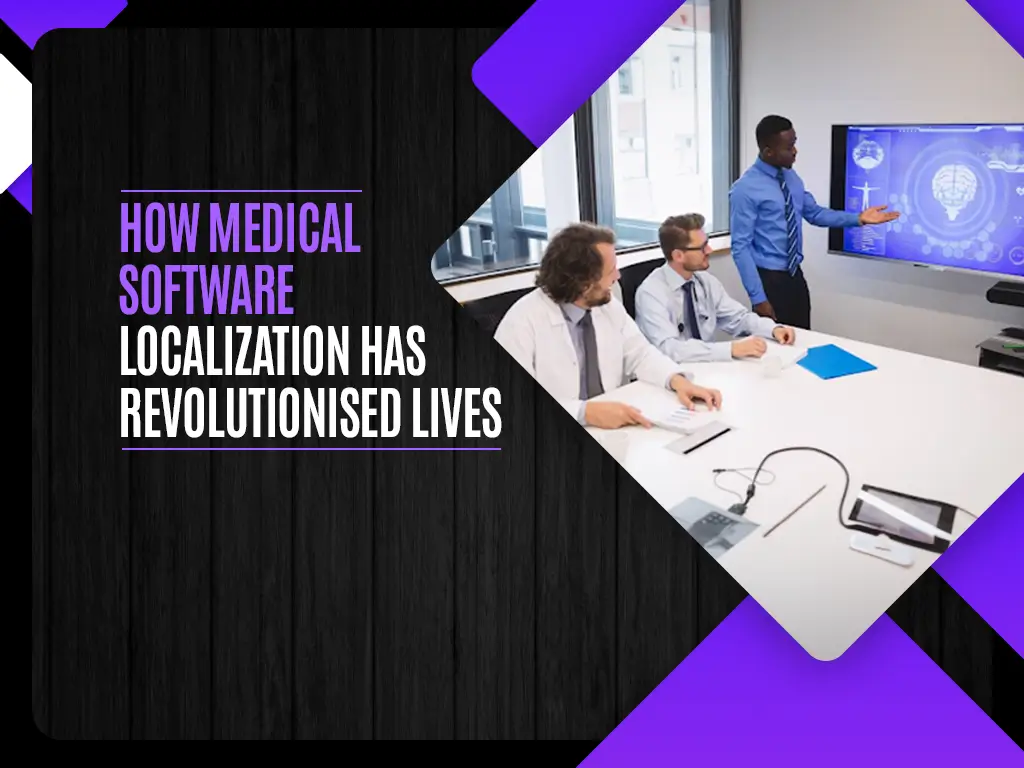How medical software localization has revolutionised lives

Localization has become an imperative part of every business and industry. The medical sector is no different and it needs localization more than any other business. As the medical needs of the people across various regions are more or less similar. The medical software localization services hence help ensure that the healthcare information, products, medicines, and medical devices have an accurate and relevant translation. This is also important to meet the cultural and language needs and to adhere to the compliance and regulatory requirements that different countries have defined for medical localization.
The medical industry has been reshaped since the pandemic COVID-19 struck us 4 years back. Every region demanded the vaccine and medicines to deal with the COVID. There were clinical trials carried out. That was the time that made medical companies, scientists, and researchers along with WHO realize that medical localization has become an ultimate need to meet the medical needs of people of different ethnicities and groups. Since the pandemic made people lock themselves in their houses, online businesses and markets flourished. The global software localization market size reached $5.9 billion and is projected to reach $15.6 billion in 2032.
Seeking medical software localization services has helped patients have control over their treatment process and other conditions. The patient care has improved now.
Here is how medical software localization has changed the lives of everyone involved.
Accurate diagnosis and treatment
There are better diagnoses and treatment plans due to the medical localization. The software allows the patients to record their condition accurately. This software lets them access accurate medical information in their native language. This paves the way for a smooth communication. The patient can have a better understanding, a clear diagnosis, and the appropriate treatment plans.
Reduced medical errors
Miscommunication is common among people due to language barriers. Mistakes in medical situations can be fatal so the medical industry offers no room for medical errors. The localization mitigates this risk by providing clear instructions. They provide medical information in the patient’s language. The chances of errors and the deadly consequences often decrease, making the overall process a safe one.
Empowerment for patients
Patients have the right to be empowered where they can communicate about their medical condition, treatment, and others openly. Hence, they feel more empowered with medical localization. They can comprehend their diagnosis, treatment options, and the potential side effects they can suffer as a result of treatment. They can make informed decisions about their healthcare more conveniently. However, it is important that as a company you always seek assistance from the best app localization providers to avoid glitches and errors.
Better acceptance
The localized software allows the patients to have better and increased acceptance. The patients and healthcare staff always prefer something that is in their native and regional language as compared to a foreign language for their treatment. They tend to trust the medical devices that are tailored according to their culture, language, dialects, and nuances. This also helps encourage new technologies and therapies to improve overall healthcare scenarios. Many companies overlook this factor however, accepting this reality and tailoring a medical device and product according to the needs of the patients can make them trust more with better acceptance.
Vital role in emergencies
We all have to face and experience emergencies due to different conditions and circumstances. There are natural disasters as well. Medical software localization services hence can be of great help during such situations. The companies can quickly integrate medical devices and software in the affected regions to facilitate the affectees with basic medical support. However, it is important to note that all the information exists in their regional languages and is according to their cultural needs.
Remote monitoring
This is an advanced and digitalized era where things that people of the past never imagined are happening and have a real shape. Companies can monitor remotely and there is a practice of telemedicine as well. All these practices are not possible without localized medical software and devices. The localization in the medical industry enables patients and relevant people who come from diverse backgrounds to participate in telehealth consultations and also monitor and track the updates and situations about their health.
Global health initiatives
The pandemic also made it clear to the medical companies and the global medical industry how crucial it was to take medical initiatives globally for the better health of humans despite their diversity and region. It brought everyone on the same page getting connected for a better and safe environment. The localized public health information and education materials can also help the companies disseminate relevant information during the outbreaks and vaccination campaigns. Such collaborations and health initiatives with the help of the best app localization providers can pave the way for a smoother global health outcome.
Conclusion
Medical software localization has become a necessity for a safe and healthy global environment. Integrating the medical world with localization has made the lives of patients and healthcare staff easier. There is improved patient care, accurate diagnosis, fewer medical errors, and more empowerment for patients.

